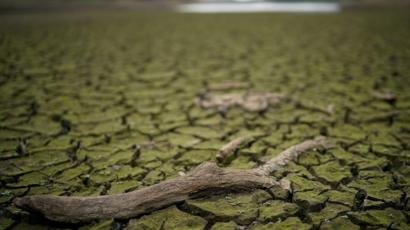Climate change driven by humans made heatwave 'twice as likely'
The current UK heat wave has dried out some reservoirs

Researchers compared the current high temperatures with historical records from seven weather stations, in different parts of Europe.
Their preliminary report found that the "signal of climate change is unambiguous," in this summer's heat.
They also say the scale of the heatwave in the Arctic is unprecedented.
The scale and breadth of the current heat being experienced across Europe has prompted many questions about the influence of global warming on extreme events.
To try and see if there is a connection, researchers defined a heatwave as the three warmest consecutive days in a year and looked at data from seven weather stations, in Finland, Denmark, Ireland, the Netherlands, Norway and Sweden.
They chose these locations because they all had digitised records dating back to the early 1900s, unlike the UK. The team also used computer models to asses the scale of human-influenced climate change.
The researchers found that in the weather stations in the Netherlands, Ireland and Denmark, climate change has generally increased the odds of the current heatwave by more than two-fold.
Staying cool has become a major concern in the current heat wave

The scientists said that a similar heatwave is likely to occur in about ten years in southern Scandinavia and Ireland, and in about five years in the Netherlands.
"The logic that climate change will do this is inescapable - the world is becoming warmer, and so heatwaves like this are becoming more common," said Dr Friederike Otto, Deputy Director of the Environmental Change Institute at the University of Oxford
"What was once regarded as unusually warm weather will become commonplace - in some cases, it already has." she added.
While acknowledging that the current heatwave in the Arctic is unprecedented in the historical record, the researchers were not able to clearly resolve the impact of human influence.
That's because summer temperatures vary a good deal from year to year so the trend was impossible to estimate from the observations, the authors said.
One question the scientists were not able to answer was whether climate change had an impact on keeping the prolonged high pressure system over Europe. They hope to do this when they publish a more thorough analysis of this summer's events in a scientific journal. However they argue that their initial findings should prompt more action from governments.
"We are not taking the right measures," said Dr Robert Vautard, from the CNRS in France.
"We are discovering climate change rather than doing something against it."
Thank you
Most welcome